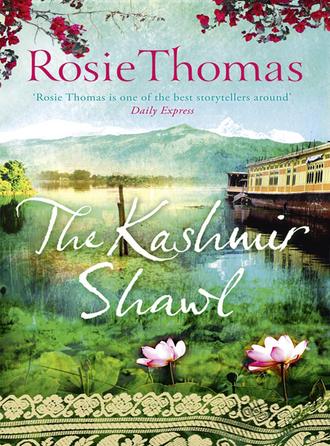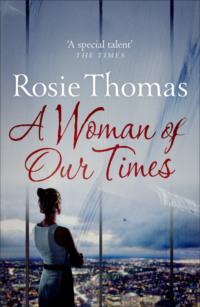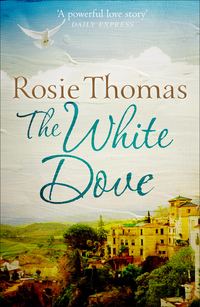
Полная версия
The Kashmir Shawl

Rosie Thomas
The Kashmir Shawl

Dedication
For my father
The mountain sheep are sweeter,
But the valley sheep are fatter;
We therefore deemed it meeter
To carry off the latter.
Contents
Title Page
Dedication
One
Mair made the discovery on the last day at home…
Two
Back in Leh, Mair spent a day trying to find…
Three
He had taken their candle behind the screen with him.
Four
When Nerys came round, it was to see a circle…
Five
To get across the mountains from Leh to Srinagar, Mair’s…
Six
The two women picked their way between tables and parasols,…
Seven
The band struck up and the maharajah himself led out…
Eight
Solomon and Sheba was close-moored in a line of other…
Nine
‘It’s not too cold,’ Rainer insisted.
‘Zahra’s Shawl’
Ten
Winter came. In early December 1941 Japanese troops invaded Malaya.
Eleven
Two days after Christmas, Nerys and Rainer drove the little…
Twelve
A startling crash in the undergrowth, then a long rattle…
Thirteen
The chapel was small, austere and brown-varnished. The windows were…
Fourteen
‘Do you know for certain?’ Myrtle asked. A plume of…
Fifteen
He was as handsome as always, and as secretive. She…
Sixteen
The launch drew closer, its bow pennant drawn taut by…
Seventeen
The tiny coronet of blue flame seemed too fragile to…
Eighteen
Mair spent that Christmas with Dylan, Jackie and their smaller…
Nineteen
The house was in a leafy street in south Delhi,…
Acknowledgements
About the Author
Other Books by Rosie Thomas
Copyright
About the Publisher
ONE
Mair made the discovery on the last day at home in the old house.
The three of them were upstairs in their father’s bedroom. They had come together for the melancholy business of sorting and clearing their parents’ furniture and possessions, before closing up the house for the last time and handing over the keys to the estate agent. It was the end of May and the lambs had just been taken away to market. Out on the hill the sheep were bleating wildly, loud, incessant and bewildered cries that were carried in with the scent of spring grass.
Mair had made a pot of tea and laid a tray to carry upstairs to her sister Eirlys. Their brother Dylan came behind her, ducking as he had had to do from the age of thirteen in order to avoid hitting his head on the low beam on the landing.
Eirlys’s energy was prodigious, as always. The floor of the bedroom was squared with neat piles of blankets and pillows, towers of labelled boxes, crackling black bags. She stood at the foot of the bed, resting a clipboard on the bedpost and frowning as she scribbled amendments to one of her lists. With the addition of a white coat and a retinue of underlings, she could easily have been on one of her ward rounds.
‘Lovely,’ she murmured, when she saw the tea. ‘Don’t put it down there,’ she added.
Dylan took a cup and wedged himself on the windowsill. He was blocking the light and Eirlys flicked an eyebrow at him. ‘Drink your tea,’ he said mildly. ‘Go mad, have a biscuit as well.’
Mair sat down on the bed. The ancient pink electric blanket was still stretched from corner to corner, and she thought of the weeks of her father’s last illness when she had come home to the valley to nurse him, as best she could, and to keep him company. They had enjoyed long, rambling conversations about the past and the people her father had once known.
‘Did I ever tell you about Billy Jones, the auctioneer?’
‘I don’t think so.’
‘He had a stammer.’
‘How did he manage?’
Over the top of his spectacles her father had glanced at her. ‘We weren’t in such a hurry, you know, in those days.’
In the low-ceilinged room the old man seemed very close at hand, and at the same time entirely absent.
Eirlys was pointing out which bundles were to be taken away to charity drop-offs and what exactly the house-clearance people could be left to deal with. There was a question about the linen bed-sheets that had been stored in the same cupboard for as long as they could all remember and were mysteriously kept for ‘best’, probably according to some long-ago edict of their mother’s. But when the sisters had unfolded the top sheet they saw that it was worn so thin in the middle that the light shone straight through. Eirlys pursed her lips now and briskly consigned it with its partner to one of her graded series of bin-bags.
The sun was slanting through the window, painting Dylan’s jumper with a rim of gilded fuzz.
Mair found that she couldn’t sit still any longer and let the wave of memories engulf them all. She jumped up and went to the bow-fronted chest of drawers facing the end of the bed. Their mother had inherited it from her own mother – she remembered hearing that. Gwen Ellis’s clothes had been stored in here after her death, until at last her widower and her elder daughter had recovered sufficiently to be able to give them away.
The pair of split drawers at the top was empty. Eirlys had even removed the lining paper. The middle one had recently held their father’s vests and pants and folded shirts. As he had grown weaker, Mair had helped him dress in the mornings. In the vain hope of making his bones feel warmer, she would hold the underclothes in front of the electric fire before handing them to him. A heap of these things now lay on the floor.
‘We’ll have to put those bits and pieces of his in the bag for recycling.’ Eirlys nodded. ‘They’re no good for anything else.’
Mair slid open the bottom drawer of the chest. She saw a few yellowing pillow-cases, and the tablecloth with the cut-work centre panel that was taken out once a year without fail to be smoothed over the Christmas dinner-table. The white fabric was stained in places with rust. Reaching beneath the cloth, her fingers came into contact with tissue paper. She lifted out the cloth to investigate what lay beneath it.
The tissue paper was very old and limp.
When she folded it back her first impression was of wonderful colours. Silvery blues and greens sprang at her, like a distillation of lake water and spring skies, with starbursts of lavender and vermilion flowers caught in the depths. She looked more closely and saw the intricacy of the woven pattern; the sumptuous curved teardrop shapes with curled tips, the ferny fronds and branched stems and tiny five-petalled flowers. The only sound in the room was the distress of the sheep as Mair shook out the layers of soft wool. It was so light that it seemed to float on the air.
The shawl was a lovely thing, and she had never seen it before.
An envelope had fallen out of the folds. It was an old brown one, ordinary, creased in half, with the glue long ago dried from the flap. Gently Mair eased it open. Inside there was a single lock of hair. The curl was very fine and silky, dark brown, with a few coppery threads shining in it. She pinched it between her fingers.
‘That’s Grandma Watkins’s shawl,’ Eirlys said, in her authoritative way.
‘It’s so beautiful,’ Mair whispered.
Eirlys was the only one of the three who had known their mother’s mother, and even she had no recollection of her because she had died when Eirlys was still a baby. All any of them knew was that she had been out in India with her much older missionary husband. The couple finally came back to Wales and had had their only child when Nerys was already in her forties. That daughter, Gwen, had married a neighbour from the same valley, handsome Huw Ellis, when she was only nineteen. She had always said to her own three children that she didn’t want them to grow up with elderly parents, the way she had done.
‘Whose hair can this be, do you think?’ Mair wondered.
‘I’ve no idea,’ Eirlys said.
Mair thought about it. Grandma Watkins wouldn’t have kept her own hair, would she? Was it her husband’s, then, or more probably her child’s?
No. This wasn’t the hair of an elderly missionary, and it wasn’t Gwen’s either, she was fairly sure of that – hers had naturally been a quite different, much lighter colour.
Whose, then?
The question intrigued her, but it seemed to have no answer.
She pressed the shawl to her cheek. The fabric was so fine that she could enclose it in her two fists. For the first time, she breathed in its faint scent of spice.
‘We’ve still got a lot to do,’ Eirlys said, as she finished her tea.
Thoughtfully Mair slipped the lock of hair back into its envelope.
Later, when most of the packing and boxing were done, the three of them gathered in the kitchen. The back door stood open and midges floated in on the breeze. The noise of the sheep grew louder and more plaintive as twilight crept up. Dylan had opened a bottle of wine, and Mair was putting together a picnic supper of cold ham, with baked potatoes from the microwave. Dylan had bought it for their father a couple of years back and Huw had used it regularly to heat up supermarket ready-meals for one, declaring that they were very tasty. Eirlys had disapproved, pointing out that ready-meals were high in fat and salt.
The machine pinged and Mair took out the potatoes. She could just see their father winking and silently going heh-heh-heh-heh.
Without warning, tears threatened to spill out of her eyes.
They all knew that this was the last evening they would ever spend together in the old kitchen. Mair was determined not to make it more sorrowful by indulging in any fit of weeping. She smiled instead, at Dylan who was sitting with his hands in the pockets of his jeans and then at Eirlys, with her hair hooked behind her ears and her eyes looking very shiny behind her glasses.
‘Should we eat in the other room?’ Mair asked.
The table in there was a better size for three than the drop-flap one wedged in the kitchen corner, where the memory of their father sitting alone with his cup of tea and the newspaper was very clear.
The business of taking the food through and finding the last pieces of unpacked cutlery carried them through the moment. Dylan found some candle stubs and Eirlys put them in a saucer. The glow made the stripped-out room look inviting again, blotting out the dust squares on the walls where pictures used to hang.
‘We should talk about the good things,’ Eirlys said, when they were all sitting down.
For a second Mair thought she meant the happy times they had spent as a family, and the uncharacteristic sentiment startled her. Then she realised that her sister was talking about the two or three pieces of furniture and old silver that were all there had been of real value in the house. Since the reading of the will they had known that the proceeds from selling the house were to be divided equally between them. The smaller items they hadn’t really talked about.
There was the grandfather clock, with a painted face showing the sun and moon, whose sonorous tick had measured out the long afternoons of her childhood. Huw had mentioned it once, in the last weeks, referring to it as ‘Dylan’s clock’. Mair had deliberately ignored him because she didn’t want to acknowledge what he meant.
‘You’ll take the clock, Dylan,’ Eirlys said. ‘Mair?’
The other two were married, and they owned houses with hallways and alcoves and shelves. Mair was not, and she lived happily in a rented one-and-a-half-room flat. She didn’t need, or even want, her mother’s bow-fronted chest or silver teapot. They would find a better home with Eirlys. She laid down her knife and fork and cleared her throat.
‘I would like to have Grandma’s shawl,’ she said. ‘If that’s all right?’
‘Of course it is.’ Eirlys nodded. ‘If you agree, Dylan?’
He looked at Mair. There were quite deep lines at the corners of his eyes, these days. He and Eirlys were both shortsighted, and Dylan tended to screw up his eyes when he was concentrating.
Awareness of how much she loved her brother wrapped round her like a blanket. All her life he had been her ally, whereas as children she and Eirlys had constantly squabbled, mostly because they were each other’s embodied opposites. Not that they had quarrelled recently, of course. The loss of their adored father had made them considerate of each other, even wary.
‘Do you know where it might have come from?’ Dylan asked her.
She said, ‘No. But maybe I could try to find out.’
This idea only came to her as she gave voice to it. She was surprised by the curiosity that the mysterious shawl aroused in her.
That night Mair and Eirlys went to bed for the last time in the room they had shared as children. Mair could tell that her sister wasn’t asleep, although she didn’t twist and turn between the damp sheets like Mair was doing. In the end she whispered, ‘Eirlys, can’t you sleep?’
‘No.’
‘What are you thinking about?’
‘The same as you, probably. Once your parents are both dead, you really are it, aren’t you? You’re responsible, because there’s no one standing in front of you. Do you know what I mean?’
Sympathy flooded through Mair. Her sister had been behaving responsibly for her entire life. She had been a prizewinning medical student and had just been appointed to a consultant’s post at her Birmingham hospital, yet she had still found time to marry and have two boys. All her life she had been studying and looking after other people, and now her vision of this latest phase of their lives was of yet more weight falling on her shoulders.
Mair thought, Ever since I could walk and talk, I’ve been skipping away from the path my sister and brother trod ahead of me. Instead of following them to a good university she had left home and Wales at seventeen, fulfilling a long-standing promise, halfway between a family joke and a rebellious threat, to run away and join a circus. And at Floyd’s Family Circus she had met Harriet Hayes, or Hattie the Clown. Together they had worked up a simple trapeze act. Their nights at the circus were a long way behind them now, but they had been close friends ever since. In the intervening years Mair had also been a dress-shop manager, the singer in a band, a receptionist, a PR, a nursery assistant, a bookseller, and several other incarnations in the job market, with varying degrees of success, but usually some satisfaction.
No, even Hattie wouldn’t call me responsible, she acknowledged. And Hattie was quite a lot more frivolous than Eirlys.
Mair’s heart began to pound against her ribs and a white light blazed behind her eyes. Her body felt suddenly as light as a feather, and she realised that what she was feeling was free. She wanted to capture this blessing, and at the same time she longed to share some of it with her sister. Her fingers reached out and touched the fringes of the shawl, which lay on the chair beside her bed. ‘Yes, I do know what you mean,’ she said. ‘Eirlys, I’ve been thinking. I might do some travelling. You know, now Dad’s gone and, like you say, there’s just us left behind. I was wondering about going to India – perhaps see what I can find out about Grandma and her shawl. I’d be unravelling some family history. Why don’t you come with me? We could spend some time together. We haven’t done much of that lately.’
There wasn’t so much as a second’s hesitation before Eirlys replied, ‘I couldn’t possibly. There’s the hospital. It’s difficult for the whole team, with the latest cuts. And who’d look after Graeme and the boys? You should go, though, if that’s what you really want to do. I saw the way you looked at the shawl.’
Mair knew there was no point in trying to change her sister’s mind. Eirlys was decisive enough for two people. ‘I do think it might be interesting,’ she said.
She didn’t try to articulate the feeling of rootlessness that had troubled her since their father’s death. Eirlys and Dylan were settled, and she was far from being so herself. Perhaps uncovering some family history might help her to feel her place again.
‘You might not find out anything at all. India’s a big country. But you deserve a break and a new horizon. Grief can take all sorts of different forms, you know. And you took on most of the burden of looking after Dad. Dylan and I are really grateful for what you did, giving up that job and everything.’
Mair blinked hard in the darkness, but hot tears still escaped from the corners of her eyes. After the funeral Eirlys had remarked that the baby of the family was so busy being unconventional that it didn’t leave much time for her to focus on anything else. That had stung Mair, but now she reflected that grief did indeed take many forms. Eirlys’s caused her to be more tart than usual. The realisation made her sister’s kindness now seem even more touching and valuable. She murmured, ‘It was a privilege. I’m glad I was free to do it.’
‘Take some time, have a trip to India. If you need a reason and the shawl gives you one, that’s fine,’ Eirlys concluded. ‘Now, can we go to sleep?’
Outside, the bleating of the sheep had finally subsided. Mair knew why. Once night had fallen, the ewes understood that their lost lambs could never be called back. The occasional despairing cry still rose to the stars, but the flock was settling into silence.
Mair woke up and lay in the narrow bed, trying to work out where she was. She had been dreaming of a dog barking and animals stirring in response, a rustle of alarm passing among them before the leaders broke away and scudded across the bitten ground. Then sunlight flooded a hillside with sudden colour and the moving animals flowed into grey-on-green paisley patterns against the grass. A sheepdog chivvied them towards a stone enclosure where a farmer was holding the gate open.
In the way that dreams unfold, a familiar and beloved place had become merged with another she hadn’t yet visited. The room was cold and she shivered, pulling the blankets round her shoulders. As she did so the first call of the muezzin broke through the shutters.
The skin at the nape of her neck prickled, not just with the chill but with anticipation.
She remembered.
She opened her eyes wider, struck by anxiety in the grey dawn. The hotel room was cramped and liberally strewn with her belongings. Last night she had burrowed through her bags, searching in a power blackout for pyjamas and bed socks. But the shawl was safely there, neatly folded over the back of the room’s single chair. The light wasn’t strong enough yet to reveal the colours in their full glory, but they were vividly printed in her mind’s eye.
Mair pushed back the covers and sat up. It was too early, but she knew she wasn’t going to fall asleep again.
She had decided to give herself a full day to acclimatise. So, after a solitary breakfast in the hotel’s chilly and deserted dining room, she made her slightly nervous preparations. Into her shoulder-bag went the sketch-map of the town that the smiling Ladakhi receptionist had given her, a bottle of mineral water, some antibacterial gel and a well-rinsed apple. She was uncertain enough of what lay ahead to experience a breathless flutter beneath her diaphragm that had almost nothing to do with the effects of altitude.
Mair had never been to India before, not even to the beaches of Goa or the sights of Jaipur, let alone to a remote town in the Himalayas. Nor was she – in spite of her declared independence – at all used to travelling alone. Holidays, when she could afford them, had in the past usually involved the Greek islands or Spain, with a new boyfriend or one who was on the way out, or some looser combination of friends almost always including Hattie. As usual, Eirlys had been right when she had pointed out that Mair didn’t often break off from her studied absence of routine.
Mair smiled again as she locked her hotel-room door. She was free now, wasn’t she? Days and weeks of formally unallocated time stretched ahead of her. Thanks to the sale of the old house in Wales, she had some money, and time to spare for the strange project that had gnawed at her imagination for months in a way she didn’t properly understand. She hadn’t talked very much about the undertaking, even to Hattie, because it would have been too difficult to make her compulsion sound intelligible.
Just the same, the vaguest of vague plans had brought her all the way here to Leh, on an open ticket, with no fixed return date in mind to confine or comfort her.
She walked down the concrete path from the hotel, past beds of zinnias and cosmos and gaudy marigolds, and out into the street. Heading towards the centre of town, she gazed round her in fascination. It was the end of September, and she saw that Leh’s short tourist season was practically over. Already many of the craft shops and travel agencies lining the road had rolled down and locked their permanent metal shutters ready for winter, and the Internet cafés that catered to backpackers and trekkers were almost deserted. The high peaks ringing the town glittered with fresh snow, and the poplar trees in hotel gardens rustled with dry golden leaves.
In a month’s time the real snows would come, and the high passes linking the Ladakhi capital with the Vale of Kashmir to the west and Himachal Pradesh to the south would be impassable until the spring thaw came. For six months the only way into Leh would be by air, as Mair had arrived yesterday, flying from Delhi into the little airport beside the Indus river. As she walked she was trying to picture what it would be like here in midwinter, when the narrow alleys of the town would be clogged with snow and the roof of each house piled high with sheaves of dried fodder for the family’s animals. But she was distracted. The imminent disappearance of tourists meant that the town’s salesmen were urgently trying to make a last few rupees. In the main street three of them cut off her progress with a practised pincer movement.
‘Hello, madam, where you from? Look at my shop, please.’
‘I have beautiful pashmina, I make you a very good price today.’
The third man pouted when she experimentally shook her head. ‘But looking is free, madam. Just looking. What is the great hurry?’
She was in no hurry, that was true. Laughing, she followed the nearest merchant up the steps into his cluttered shop and let him show off his stock. From Tibet there were trays of silver, coral and turquoise jewellery, from China painted Thermos flasks and furry nylon blankets in electric hues. There were prickly hats and waistcoats, locally knitted from goat’s hair, woven bags with tassels, and racks of T-shirts in every size and colour – mostly bearing a machine-embroidered yak on the front and the slogan ‘yak yak yak Ladakh’. Her eyes were acclimatising to the dim light of the shop’s interior. Against the walls there were ramparts of samovars and copper dishes and crewel-work rugs.
‘It’s very nice. Thank you for showing me. I’m not shopping today, though.’
The man was Kashmiri, and therefore born to sell. ‘You want pashmina.’ It wasn’t a question. At the back of the shop floor-to-ceiling shelves were stuffed with layers of folded fabric.
‘Show me.’
Immediately he began to whirl shawls off the shelves. A drift of colour built up on the tiny counter, yellows and blues and fuchsia pinks. ‘See? Feel, beautiful. Best quality. Pure pashmina.’
Mair knew a lot more about fine shawls than she had done four months ago, when the exquisite piece that was now locked in the hotel safe had first come into her possession. She understood the quality of the craftsmanship, and its likely value. ‘Pure?’ she said. ‘Really?’









